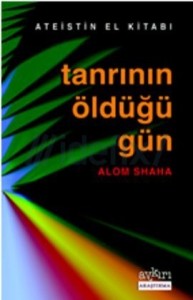Introduction to Turkish Edition
 The Turkish edition of The Young Atheist’s Handbook was published a few weeks ago. Over there, the publishers have gone with a different title, Tanrının Öldüğü Gün (“The Day God Died”), taken from chapter one of the English edition. Here’s the introduction I wrote for it:
The Turkish edition of The Young Atheist’s Handbook was published a few weeks ago. Over there, the publishers have gone with a different title, Tanrının Öldüğü Gün (“The Day God Died”), taken from chapter one of the English edition. Here’s the introduction I wrote for it:
There is a Turkish grocery store in my neighbourhood which is open 24 hours a day, 365 days a year. It is a remarkable sight on Christmas day, when most of London is eerily still and quiet because almost all other shops and businesses are closed. The shop is popular with locals – the staff are friendly and helpful and there is a wonderful selection of products including, of course, Turkish Delight. I often stop there on my way home from work to buy fresh ingredients – coriander, chilies, ginger and garlic, and usually some lamb chops or liver – with which to cook my evening meal. I suspect the shop’s butcher thinks I buy my meat there (instead of from the supermarket where it is cheaper) because it is halal, after all, I look like many of the other Bangladeshi Muslims who live locally. He always greets me with a cheerful “asalamu-alaikum brother” and I always reply “walaikum salaam”. I have never had the opportunity to, nor seen the need to tell him that I am not a Muslim, that I am an Atheist. I wonder what he would think? Would I fall in his estimation? In an ideal world, he would simply shrug and still call me “brother” and continue to wish peace upon me.
As a child, when I still thought of myself as a “Muslim”, I was excited to find out that the Turkish children at school were also Muslim, as I had previously only known Bangladeshi Muslims. It seems to be a human instinct that we prefer people who are similar to us, so I am sure that many Bangladeshis and Turks in the UK will have first become friends through their common religion.
Just as I grew uncomfortable with following Islam as I grew older, I know there must be young Turkish people in both the UK and in Turkey who realise that the religious stories handed down to them by their parents are not ones which they can believe. I know there must be Turkish people who go through the same difficulties that I have seen so many Bangladeshi “Ex-Muslims” go through in the UK and it is my hope that my book might, in some small way, help them make their own journey towards happy, fulfilling lives as non-believers.
It seems to me that Bangladesh and Turkey both have a complicated relationship with religion and democracy, and that secularism is under attack in these countries which have previously taken pride in their separation of state and religion. I have been saddened by the many reports of state persecution of anyone, particularly artists and writers, who openly criticise Islam in Turkey. As I write this, the Turkish composer and pianist Fazil Say faces trial later this year, on charges of “insulting Islamic values”. He has said that the trial is “saddening not only when judged on its own merit but also for Turkey’s image.”
It is therefore heartening that a Turkish publisher has chosen to publish my book, which is very much one that promotes atheism and encourages the questioning of Islam, and indeed any religion, as a way of life. I don’t know if there will ever be a Bangladeshi translation of my book but I am incredibly grateful to my Turkish publishers for giving me the opportunity to take my story to people in Turkey. I wish I could read Turkish because I am sure that Nuray Onoglu has done a wonderful job with the translation – I know of the care and attention she took to ensure that she was accurately conveying what I wrote in English.
My story is one of a Bangladeshi child who grew up in the UK, but I hope it is one that will resonate with my Turkish brothers and sisters everywhere. With peace and love,
Alom Shaha
London, July 2012
selam.
just finished to read the book -the turkish edition-
didnt know about it i met randomly.
every time İ believe the word says the story of a person/family explain many many things for a decade or for a country.
even decribed handbook this book has a value such this.
by the way i am a turkish islamist from istanbul.
don’t you mean bengali?
seen a few people on your journey, may the end be a good one.
The Day God Died is such a powerful title in itself. Religion has always been a sensitive topic among many people. Some may act indifferent about it while many have become almost too obsessive that it suddenly becomes immoral.
It is ironic that Secularism was imposed on Turkey. Bangladesh has never been secular democracy.